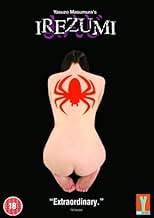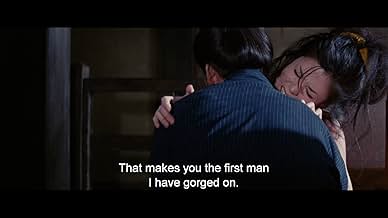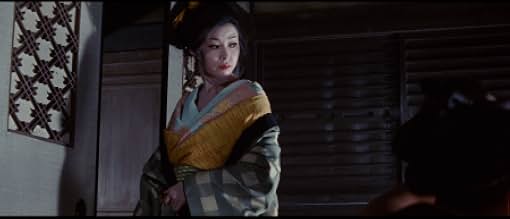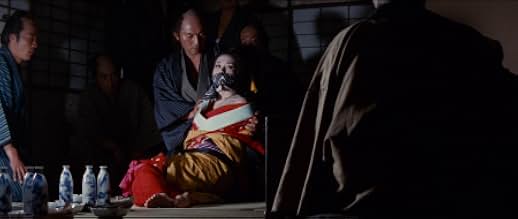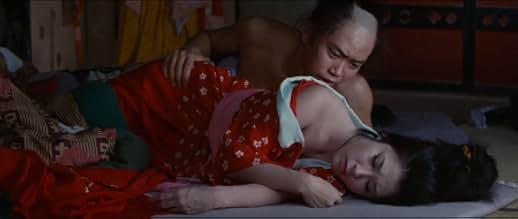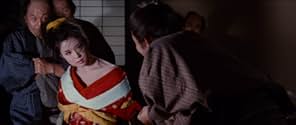NOTE IMDb
7,1/10
1,5 k
MA NOTE
Une femme séduisante est enlevée et forcée de se prostituer. Après s'être fait tatouer une araignée dans le dos, elle devient avide de vengeance et laisse plusieurs hommes sur son chemin.Une femme séduisante est enlevée et forcée de se prostituer. Après s'être fait tatouer une araignée dans le dos, elle devient avide de vengeance et laisse plusieurs hommes sur son chemin.Une femme séduisante est enlevée et forcée de se prostituer. Après s'être fait tatouer une araignée dans le dos, elle devient avide de vengeance et laisse plusieurs hommes sur son chemin.
- Réalisation
- Scénario
- Casting principal
Avis à la une
Most impressive bloody drama of operatic proportions. Doubly wronged our heroine ends up a geisha with a tarantula tattoo upon her back. Apparently the first part of the Japanese word for tarantula means prostitute and so she feels she has no alternative but to remain in the profession into which she was forced. What she can do though is take revenge and hey does she take revenge. This is beautifully photographed action all the way and it gets plenty bloody, with a wonderfully over the top ending that makes you want to stand and applaud. How much this is a tale of an exploited woman and that of a woman overcoming adversity will be up to each viewer to decide. Gentle eroticism is a bonus and if this is not quite as crazy as the same director's Blind Beast it is just as audacious. Bold, bright and beautiful.
The first thing that stood out to me is how beautifully this movie is shot and has some amazing freeze frames that should be framed on a wall. Having the lead woman have so much control not only when she receives the spider tattoo, but also in her own relationship before it was a surprising thing to see in a movie from the 60s. There is an interesting mystery of how much the spider tattoo is influencing her or if a large part of her actions are a understanding result of her being kidnapped and sold. This movie could have easily gone down the exploitation route, but it clearly had more to say and took itself way more seriously. I am very thankful for that.
"Irezumi" (which means "tattoo" in Japanese) is an erotic costume film from one of the bad boys of '60s Japanese cinema. Director Masumura used a full palette of primary colors (with very vivid reds) to tell us about the story of Otsuya, a beautiful young woman from a middle-class merchant family who is abducted into geisha work, and who catches one day the eye of Seikichi, a tattoo master who marks her back with a huge, monstrous spider. From that moment on, Otsuya will take her revenge with every man who shared her bed.
If you have an appetite for perverse stories, try this one. To play Otsuya, Masumura used beautiful actress Ayako Wakao, best remembered in the West for her part in Mizoguchi's "Street of Shame" (1956), where she was Yasumi, the cold-hearted and money-greedy prostitute. She inspired Masumura throughout the '60s, and "Irezumi" is one of their best collaborations. Adapted to the screen by Kaneto Shindo (the internationally acclaimed director of "The Naked Island" and "Onibaba"), the script goes far beyond Junichiro Tanizaki's original short story. In Tanizaki's work, a sadistic tattoo artist searches for his ultimate canvas, a beautiful girl, to create his masterpiece. The girl is innocent until the tattooer finishes "pouring his soul" into her tattoo, which represents a huge tarantula (it is better to know that "tarantula" in Japanese is "jorôgumo" and "jorô" stands for "prostitute", as both attract men to suck their blood). She becomes thus the "femme fatale" of his dreams. In "Irezumi", we never know if Otsuya is evil by nature or if the tattoo is the cause of her misconduct and bad manners, and that's the most fascinating aspect of the film. As it is a "pinku eiga" of the '60s, don't expect graphic sexual scenes but highly suggestive shots (which are more than enough) and enjoy this shameless film. As for me, I still haven't decided yet whether it is a misogynous film or its complete opposite. And what about the spider? It's a... uh, very special piece of art.
If you have an appetite for perverse stories, try this one. To play Otsuya, Masumura used beautiful actress Ayako Wakao, best remembered in the West for her part in Mizoguchi's "Street of Shame" (1956), where she was Yasumi, the cold-hearted and money-greedy prostitute. She inspired Masumura throughout the '60s, and "Irezumi" is one of their best collaborations. Adapted to the screen by Kaneto Shindo (the internationally acclaimed director of "The Naked Island" and "Onibaba"), the script goes far beyond Junichiro Tanizaki's original short story. In Tanizaki's work, a sadistic tattoo artist searches for his ultimate canvas, a beautiful girl, to create his masterpiece. The girl is innocent until the tattooer finishes "pouring his soul" into her tattoo, which represents a huge tarantula (it is better to know that "tarantula" in Japanese is "jorôgumo" and "jorô" stands for "prostitute", as both attract men to suck their blood). She becomes thus the "femme fatale" of his dreams. In "Irezumi", we never know if Otsuya is evil by nature or if the tattoo is the cause of her misconduct and bad manners, and that's the most fascinating aspect of the film. As it is a "pinku eiga" of the '60s, don't expect graphic sexual scenes but highly suggestive shots (which are more than enough) and enjoy this shameless film. As for me, I still haven't decided yet whether it is a misogynous film or its complete opposite. And what about the spider? It's a... uh, very special piece of art.
Following the doomed and star-crossed love between the feisty daughter of a wealthy merchant and the timid clerk that works for her father, IREZUMI is cut from the mould of classic Shakespearean tragedy but with a distinctly Japanese spin. For reasons that elude me, the Japanese have taken quite an affection to their idea of the deceitful femme fatale, the "spider woman". Here the feisty daughter becomes one quite literally by having a grotesque "spider woman" tattooed by force on her back on orders of the pimp she's sold to. While her lover prowls the red districts of Yoshiwara looking for her, she leads a luxurious life as a geisha by scamming people off their money with her pimp as an accomplice.
Weaving together a typical revenge plot and the idea of psychosomatic auto-suggestion as the woman starts to believe that she's "really" a spider woman after being tattooed and urged by her pimp to leech money off her clients, director Masumura and writer Kaneto Shindo (who also scripted MANJI for Masumura and directed some very famous Japanese horror movies like ONIBABA and KURONEKO) create in IREZUMI a bold, beautiful, no-nonsense revenge drama that doesn't skimp on the violence. When people get killed, it's ugly and messy. When they don't, they weave around them webs of lies and deceit or find themselves caught in one.
Masumura's assured but laconic direction (no tracking shots, no moving cameras - his camera remains locked on a tripod with the occasional imperceptible pan) is a masterclass in miss-en-scene, careful framing and pacing a movie without calling attention to his work as director. Simply put, the guy knows how to take a great shot and he knows how to pile great shots one upon the other to make a great scene and he knows how to orchestrate his scenes to make a great movie that moves effortlessly from start to finish. Add to that the superb editing and some great acting by Ayako Wakao (gorgeous in the lead role) and you've got yourself a proper forgotten gem from the classic epoch of Japanese cinema. I'm looking forward to catching more of the director's work.
Weaving together a typical revenge plot and the idea of psychosomatic auto-suggestion as the woman starts to believe that she's "really" a spider woman after being tattooed and urged by her pimp to leech money off her clients, director Masumura and writer Kaneto Shindo (who also scripted MANJI for Masumura and directed some very famous Japanese horror movies like ONIBABA and KURONEKO) create in IREZUMI a bold, beautiful, no-nonsense revenge drama that doesn't skimp on the violence. When people get killed, it's ugly and messy. When they don't, they weave around them webs of lies and deceit or find themselves caught in one.
Masumura's assured but laconic direction (no tracking shots, no moving cameras - his camera remains locked on a tripod with the occasional imperceptible pan) is a masterclass in miss-en-scene, careful framing and pacing a movie without calling attention to his work as director. Simply put, the guy knows how to take a great shot and he knows how to pile great shots one upon the other to make a great scene and he knows how to orchestrate his scenes to make a great movie that moves effortlessly from start to finish. Add to that the superb editing and some great acting by Ayako Wakao (gorgeous in the lead role) and you've got yourself a proper forgotten gem from the classic epoch of Japanese cinema. I'm looking forward to catching more of the director's work.
A woman is kidnapped and drugged, then covered in a huge spider tattoo that may or may not have taken over her soul and turned her into a killer. She gets revenge on those that wronged her by becoming a geisha and causing their deaths.
A slow moving revenge movie centred around a geisha using her charms to manipulate men and killing them off. It's not really that much of a horror movie as the supernatural side isn't played up, even though it's hinted at. It's more of a samurai movie that happens to focus on the geisha and brief outbursts of violence that take the lives of others. It's interesting but not an amazing movie or anything.
A slow moving revenge movie centred around a geisha using her charms to manipulate men and killing them off. It's not really that much of a horror movie as the supernatural side isn't played up, even though it's hinted at. It's more of a samurai movie that happens to focus on the geisha and brief outbursts of violence that take the lives of others. It's interesting but not an amazing movie or anything.
Meilleurs choix
Connectez-vous pour évaluer et suivre la liste de favoris afin de recevoir des recommandations personnalisées
- How long is Irezumi?Alimenté par Alexa
Détails
- Durée1 heure 26 minutes
- Couleur
- Rapport de forme
- 2.35 : 1
Contribuer à cette page
Suggérer une modification ou ajouter du contenu manquant


